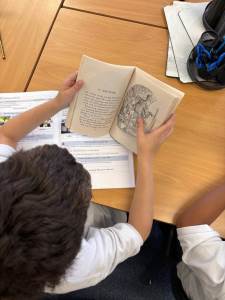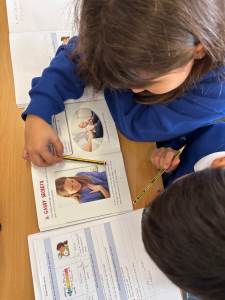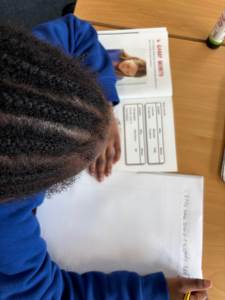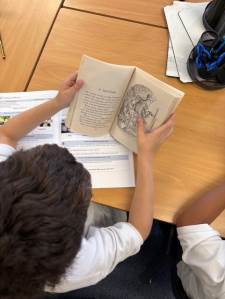English
At Bevington Primary School, English underpins everything we do. It is the medium through which we explore, question, create and communicate. Our English curriculum is ambitious and inclusive, ensuring that all pupils develop the skills and knowledge necessary to become confident, articulate communicators regardless of background or need. Rooted in the expectations of the National Curriculum, our approach is enriched through a wide range of thoughtfully selected, high-quality texts which reflect diverse cultures, experiences, and literary styles. Every child is supported and challenged to achieve a strong command of the English language, not only for academic success, but to participate fully and effectively in society.
Spoken Language and Writing
Spoken language is the foundation for effective writing. At Bevington, we develop oracy skills from the earliest stages, helping children speak confidently, listen carefully, articulate their ideas clearly, and engage in structured discussion. Every English unit builds on these speaking and listening skills and helps children to make purposeful choices when crafting written work.
Our writing curriculum is structured around rich, varied stimuli—from whole texts and picture books to animations, poetry, folk tales, and current events. Children are taught how to write for various genres and purposes, including narrative, persuasive, instructional, and descriptive writing. Emphasis is placed on audience awareness, organisation, language style and authorial voice. We encourage children to ‘think like a reader’—anticipating how their writing will be received and making thoughtful decisions as authors.
Writing is explicitly taught through daily English lessons where grammar, punctuation and sentence structure are modelled and practised. Across each unit, children build towards a final written piece, through careful planning, drafting, revising and editing. Peer discussion, shared writing, and teacher feedback are embedded into this process. Writing is often linked to topics across the curriculum, allowing children to write with purpose and with more profound subject knowledge. We also dedicate time for children to independently apply their writing skills in various contexts, developing fluency, stamina and pride in their work.
Reading at Bevington
Reading
Reading is central to our vision for all learners. At Bevington, we understand that the ability to read fluently and with understanding opens up access to the entire curriculum. More than this, reading helps children develop empathy, imagination, and insight into the lives and perspectives of others. That is why we place such importance on fostering a love of books and building a culture of reading for pleasure and information.
Children at Bevington are taught to be readers from the very start. In Reception and Key Stage 1, reading is underpinned by a consistent phonics programme and regular opportunities to practise decoding, comprehension and vocabulary. As children progress into Key Stage 2, they read increasingly complex texts and learn to analyse language, infer meaning and evaluate authors’ choices.
We provide daily opportunities for shared, guided, and independent reading. Our read-aloud sessions are a valued part of the school day, introducing children to a broad canon of literature, including classics, contemporary fiction, poetry, and nonfiction. Through discussions, book reviews, and ‘book talk,’ children deepen their comprehension and build connections across texts and genres.
Reading is integrated throughout the curriculum, including in subjects like History and Science, to ensure that children continue to apply and develop their reading skills in varied contexts. Children also have regular access to the school and well-stocked class libraries, providing engaging, age-appropriate and diverse texts surrounding them.
Early Reading and Phonics
We follow the Essential Letters and Sounds (ELS) programme to ensure all children learn to read accurately and fluently. This systematic synthetic phonics scheme is taught daily in Reception and Key Stage 1 and is designed to give every child the best possible start in reading.
Children are taught to identify phonemes (the smallest sound units) and match them with graphemes (the letters or letter groups representing sounds). These are then blended to read words and segmented to support spelling. ELS is taught as a whole-class model, meaning all pupils benefit from high-quality instruction, and any misconceptions can be addressed immediately through in-lesson support. For children needing additional help, short and focused 1:1 or small-group interventions ensure that they keep up, not catch up.
The sequence of learning within ELS is carefully structured to ensure children build their phonic knowledge logically, progressing from single sounds to digraphs, trigraphs, and quad graphs. Lessons are designed to be consistent and predictable, which helps children feel confident and secure in their learning. Reading books are fully decodable and matched to each child’s current phonic knowledge, allowing them to apply what they’ve learned in class with fluency and success at home and in school.
Daily reading opportunities, along with paired and group reading sessions, further embed phonics knowledge. Our approach also strongly emphasises vocabulary development, ensuring children develop a rich and meaningful understanding of the words they encounter.
Spelling
Spelling is taught consistently across the school, with clear progression from phonics into more advanced spelling strategies. In Reception and Year 1, spelling is embedded within the ELS phonics programme. Children are introduced to ‘harder to read and spell words’, which are revisited regularly in class and sent home for additional practice.
From Year 2 onwards, we follow Essential Spelling, which builds directly upon the phonics knowledge children have secured in the earlier years. This programme enables children to make sense of the English spelling system by applying and extending their understanding of grapheme–phoneme correspondences. Essential Spelling is taught thrice weekly, focusing on accurate encoding, understanding patterns, and learning common exception words.
Spelling is not taught in isolation; it is interwoven into writing and grammar lessons so children can apply their learning meaningfully. Children receive weekly spelling lists aligned to classroom learning and practise at home to reinforce accuracy. By Upper Key Stage 2, children explore word families, prefixes, suffixes, etymology, and morphology to better understand how words are constructed and related.
Grammar and Punctuation
Grammar is taught explicitly from Year 2 onwards, with two discrete sessions per week in Year 2 and one session in Key Stage 2. However, it is also integrated into writing lessons so that children learn to apply grammatical concepts in context. From Reception and Year 1, foundational grammar is taught through phonics and early writing activities, including punctuation, sentence construction and identification of word classes.
Our grammar curriculum follows the National Curriculum and ensures progression in complexity from year to year. Children revisit prior knowledge regularly and have opportunities to apply new grammar concepts in their writing. By the end of Key Stage 2, pupils can confidently discuss and manipulate grammar to enhance the clarity, style and impact of their writing.
Handwriting
At Bevington, we follow a whole-school handwriting progression from Year 1 to Year 6, based on the Oak National Academy handwriting sequence. This ensures a consistent, progressive, and structured approach to handwriting across the school, with pupils developing fluency, stamina, and pride in presentation at each stage.
In Reception, children are introduced to basic letter formation through the Essential Letters and Sounds rhymes, alongside daily fine motor activities that strengthen pencil grip and control.
From Year 1 onwards, pupils are taught correct letter formation, beginning with lower-case print before moving into capital letters, numerals, and groups of letters with different heights and tails. By Year 2, children are introduced to pre-cursive writing with lead-in strokes and begin to secure the four main joins in preparation for fluent, joined handwriting.
As pupils progress through Key Stage 2, they continue to refine their joined handwriting through regular, focused handwriting sessions. Each year builds on the previous, with increasing emphasis on applying joins in spelling patterns, tricky words, prefixes, and suffixes, as well as in longer writing forms such as poetry, reports, and journalistic writing. By the time pupils reach Year 6, they are expected to apply a fluent, legible, and consistent style across all subjects, with clear attention to audience and purpose.
Throughout the school, correct posture, pencil grip, and neat presentation are continually reinforced. Pupils are encouraged to take pride in their work and to evaluate and improve their handwriting as they mature.








